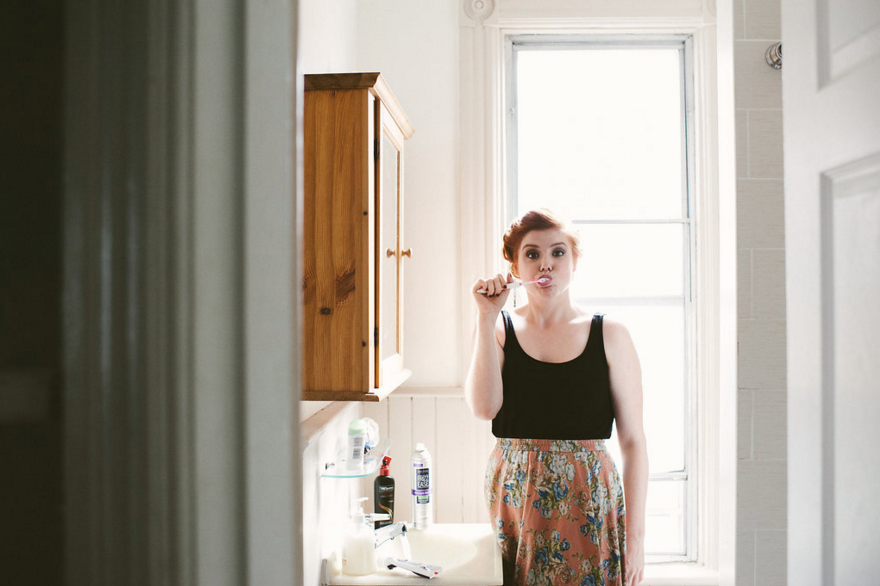
TORONTO— Comedian Stacey McGunnigle says it’s hard to be confident when you’re a teenage girl.
“You’re so concerned about what people think,” she says, recalling how self-conscious and awkward she felt as a teenager. “And I didn’t even have the internet then,” she adds. “I can only imagine what it’s like now.”
McGunnigle’s desire to arm teenage girls with boldness and self-confidence is what led her to develop Empower-Prov, a new improv comedy class at Toronto’s Second City aimed specifically at girls between grades 9 and 12.
“I think it’s just putting that tool in the toolbox young and early, about being confident, stepping forward, trusting your instincts, trusting your gut,” she says.
McGunnigle, a Second City alumna, says the skills she learned improvising being quick, resourceful, self-assured have helped her outside of the comedy world.
“Knowing who you are and knowing your voice is so crucial, especially with women,” she says. “Walking into a room and knowing your value, and knowing your boundaries, and knowing what’s appropriate and what’s not appropriate.”
She says she expects an all-female space will allow students to be more open and collaborative than they might be in a coed class, where in her experience, male voices are often the loudest.
“Even in teen classes I’ve taught before, it’s the guys who will say stuff first,” she says.
“The girls are … in the back, taking it all in, before saying anything. This course is like, no, be bold. Be brave. And feel like that’s OK.”
It’s not just teenagers who are benefiting from classes designed specifically for a female experience.
Vancouver comedian Amy Shostak ran a one-day improv workshop for women last year that was so successful it’s coming back as a four-part class at Blind Tiger Comedy. She says there are several reasons why many women are seeking out classes designed specifically for them. In addition to the benefits of building new skills in a comfortable environment, a women-only class also provides an opportunity to talk about tactics for dealing with uncomfortable situations onstage.
“The thing about improv is, it’s in the moment,” Shostak says. “When I was kind of coming up, there were lots of moments onstage where I would get offstage and feel like: I really wish I could have done something in that moment.”
She remembers one instance early in her career when a male improv performer called for a doctor, and when she walked onstage, he said, “Nurse, could you go get the doctor?” She was shocked, and didn’t know what else to do but to go get someone else.
“That moment, I always reflect on it and think, what could I have said?” Shostak says. “I could have said, ‘You don’t know me, I am the doctor.’ Or I could have said, ‘You don’t need a doctor, I’m a nurse, it’s a routine flu shot.’ There are ways that I could have probably held on to that space, but I just didn’t know how.”
One of the core principles in improv is agreeing with someone else’s premise, which can make it hard to set boundaries. But “there are some ways to say yes to an offer and still maintain your dignity,” she says.
But she also teaches her students that it’s OK to sometimes just say no.
Once, during an improv game where someone from the audience comes onstage and moves the performers around like puppets, an audience member repeatedly tried to push Shostak onto her knees in front of a male performer.
“In that moment, I just had to physically resist,” she says. “I was like: I’m not doing that.”
Amanda Scriver, who took a women-only standup class at Toronto’s Comedy Bar this summer, says she sought out a female environment because she wanted a place where she felt comfortable doing something she describes as “new and terrifying.”
“Comedy, that is the most vulnerable and terrifying you can get,” she says. “It’s just you, and some lights, and a microphone, and a stage. And that’s it. Nothing else.”
Scriver says she felt comfortable in her vulnerability because the class was a supportive environment, both in terms of guidance from instructor Jess Beaulieu and from her classmates. They all worked together to develop their joke-writing skills, and were able to workshop their material with each other.
“I feel like oftentimes women are more gentle to one another in offering criticism, but also lending support for one another,” Scriver says.
Another benefit of a female space, she says, are the topics they covered in class.
“I don’t think that if I was in a coed comedy group I could have opened up about the self-image issues that I have,” she says.
Women in the group felt safe talking about body image and sexual assault. That wouldn’t be impossible in a mixed-gender class, Scriver says, but she doesn’t think she would feel as comfortable.
That level of comfort makes a big difference in developing skills as a comedian, Shostak adds.
“The audience can feel how you feel, so if there’s a moment where they see you shrink or back-off onstage, they do notice that,” she says.
“If someone’s feeling not their best, then their comedy isn’t at their best, and that’s probably why people say women aren’t funny. They’ve seen a single woman in an improv troupe be diminished, or the audience perception of them is bad. But I think it’s because they haven’t been lifted up or given the space.”